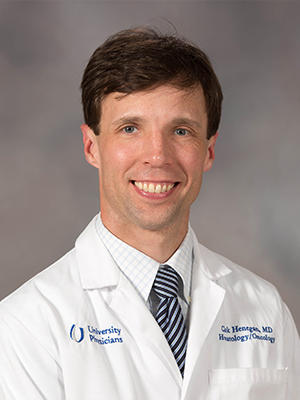
Investigator Highlight: Dr. Clark Henegan
Published on Friday, August 26, 2022
Dr. Clark Henegan is a medical oncologist who heads the UMMC Cancer Center and Research Institute’s Genitourinary Cancer Care team. He is also a CCRI Ergon Scholar, focusing on research that will help medical providers understand how patients experience cancer treatment and how they live with a cancer diagnosis and treatment. Henegan also helps vet any GU cancer trials that are offered at CCRI to be sure they are appropriate and fit needs of Mississippi patients. Henegan serves on a national cooperative group genitourinary subcommittee.
How long have you worked with your current organization and what type of research do you do?
I have been on staff at UMMC since 2013.
The research activities I participate in include genitourinary clinical trials, research surveys of patients seen at UMMC cancer clinics and meta-research related to the conduct of clinical trials.
Would you describe your most recent research and/or publications?
Our most recent local research has related to analyzing information from research surveys of patients seen at the UMMC CCRI. One research survey sought to quantify health related disparities of patients treated at our facility and compare this to a group of patients seen at a UMMC general internal medicine clinic. We found significant differences in the number and types of social determinants of health between these two groups.
A second research survey asked patients with Stage I, II, and III cancers if they felt it was “acceptable” or “unacceptable” to label a patient as a cancer survivor given several different clinical scenarios related to the risk of relapse and if a relapse occurred or not. We found that there was a difference in what was deemed “acceptable” or “unacceptable” based on if a cancer recurred or not.
How does your recent research and/or publications relate to your overall research within cancer?
I think trying to understand a patient’s experience on their cancer journey is critical. As providers, we need to be able to understand how our patients process their experience. We also need to be able to support them or find support for them in ways that do not just address a diagnosis but improve life.
What advice can you give medical students and/or high-school students who are interested in pursuing a career in research?
Look around and question things. If a term, situation, environment, diagnosis, treatment, etc. seems like it could be improved on or better understood then pursue that. And ask for help from mentors and colleagues as you do.


